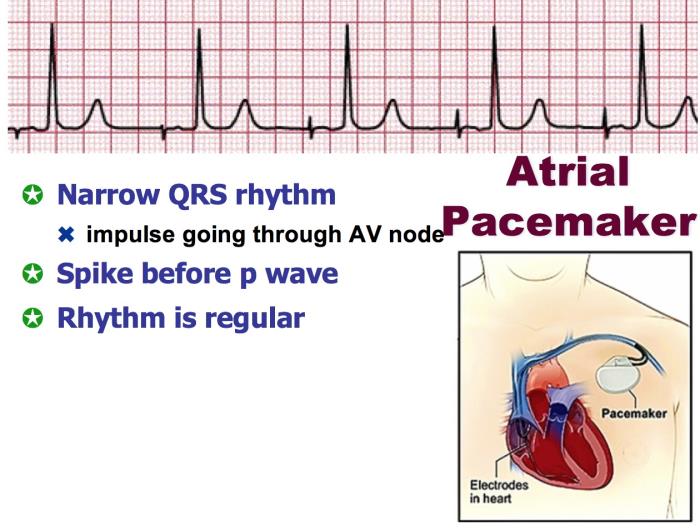A pacemaker is a medical device designed to regulate heart rhythms in individuals with arrhythmias, ensuring the heart beats at a consistent and healthy pace. By sending electrical impulses to the heart, the pacemaker compensates for irregularities such as a slow or erratic heartbeat, improving circulation and preventing complications like fainting, fatigue, or heart failure. Understanding its role is essential for recognizing when this life-saving device may be necessary and how it enhances the quality of life for patients with heart rhythm disorders.
What Is a Pacemaker and How Does It Help?
A pacemaker is a small, battery-powered device implanted under the skin, typically near the collarbone, to help manage abnormal heart rhythms. It monitors the heart's electrical activity and delivers precise electrical impulses when it detects irregularities, ensuring the heart maintains an appropriate rate. Pacemakers are used to treat conditions like bradycardia, tachycardia, or heart block, reducing symptoms such as dizziness, shortness of breath, or fainting. They enable individuals to resume daily activities with fewer restrictions and improved cardiac health.
Overview of Heart Rhythm Disorders That May Require a Pacemaker
Heart rhythm disorders, also known as arrhythmias, disrupt the normal electrical impulses that control heartbeats. Conditions like bradycardia, where the heart beats too slowly, or heart block, where electrical signals are delayed or interrupted, can severely impact health and quality of life. Pacemakers are commonly recommended for these disorders when symptoms become severe or life-threatening. In some cases, they are also used for tachy-brady syndrome, a condition involving alternating episodes of slow and fast heart rhythms.

Common Symptoms of Bradycardia (Slow Heart Rate)
Bradycardia occurs when the heart beats fewer than 60 times per minute, leading to insufficient blood flow to the body. Symptoms include persistent fatigue, dizziness, fainting, shortness of breath, and difficulty exercising. In severe cases, individuals may experience confusion or heart failure symptoms. If lifestyle adjustments or medications fail to address these symptoms, a pacemaker may be implanted to restore a normal heart rate and alleviate these issues.
Recognizing Signs of Tachy-Brady Syndrome
Tachy-brady syndrome is characterized by alternating episodes of fast (tachycardia) and slow (bradycardia) heart rates. Patients may experience palpitations, dizziness, chest discomfort, and periods of fainting due to the heart’s inability to maintain a steady rhythm. This condition often results from sinoatrial node dysfunction, the heart's natural pacemaker. A pacemaker can effectively manage bradycardia episodes and prevent symptoms, often used in conjunction with medication to control tachycardia.
Symptoms of Atrioventricular (AV) Block
Atrioventricular (AV) block occurs when the electrical signals between the heart’s upper and lower chambers are delayed or completely blocked. Symptoms vary depending on the severity of the block but may include fatigue, fainting, chest pain, and slow or irregular heartbeats. Advanced AV block can significantly impair the heart's ability to pump blood effectively, necessitating a pacemaker to restore proper communication between the chambers and maintain a stable rhythm.
Unexplained Fainting and Its Link to Heart Rhythm Issues
Frequent or unexplained fainting, medically termed syncope, can sometimes indicate an underlying heart rhythm problem. Conditions such as bradycardia, heart block, or tachy-brady syndrome may lead to a temporary loss of consciousness due to reduced blood flow to the brain. A thorough cardiac evaluation, including monitoring and diagnostic tests, can determine whether a pacemaker is needed to prevent fainting episodes and ensure a safe, regular heartbeat.
Fatigue and Shortness of Breath: Could It Be Your Heart?
Persistent fatigue and shortness of breath, especially during physical activity or at rest, may indicate an underlying heart condition. These symptoms often result from reduced blood flow caused by irregular heart rhythms, making it essential to seek medical evaluation to rule out the need for a pacemaker.
Chest Pain or Discomfort Linked to Heartbeat Irregularities
Chest pain or discomfort, accompanied by an irregular or slow heartbeat, can signify electrical issues in the heart. While not always severe, these symptoms may point to bradycardia or other rhythm disorders that could require a pacemaker for regulation.
The Impact of Dizziness and Lightheadedness on Daily Life
Frequent dizziness or lightheadedness can disrupt daily activities and may be a sign of insufficient blood flow due to heart rhythm abnormalities. If these symptoms occur regularly or lead to fainting, a pacemaker might be necessary to stabilize heart function.

Palpitations: When Should You Be Concerned?
Palpitations, or the sensation of a racing or irregular heartbeat, are common but should not be ignored if they occur alongside other symptoms like dizziness or fatigue. Persistent palpitations may indicate arrhythmias that could benefit from pacemaker intervention.
How Low Ejection Fraction May Indicate the Need for a Pacemaker
An ejection fraction below 40% indicates weakened heart muscle function and may increase the risk of heart failure or arrhythmias. In such cases, a pacemaker or a cardiac resynchronization device may be recommended to support heart function and prevent complications.
Recognizing Symptoms of Sick Sinus Syndrome
Sick sinus syndrome is characterized by an irregular or slow heartbeat and can lead to symptoms like fatigue, dizziness, and fainting. This condition often necessitates pacemaker implantation to regulate the heart's rhythm and improve quality of life.
When Lifestyle Changes and Medications Are Not Enough
For some heart rhythm disorders, lifestyle adjustments and medications may not adequately control symptoms. In such cases, a pacemaker becomes a viable solution to maintain a steady and efficient heartbeat.
How to Monitor Symptoms at Home Before Seeing a Doctor
Tracking symptoms such as fatigue, dizziness, chest discomfort, and palpitations can help identify patterns and provide valuable information during a medical consultation. Using wearable devices to monitor heart rate and rhythm can offer additional insights into potential irregularities.
Diagnostic Tests to Confirm the Need for a Pacemaker
Tests like electrocardiograms (ECG), Holter monitoring, echocardiograms, and stress tests are commonly used to evaluate heart function and rhythm. These tests help doctors determine if a pacemaker is necessary based on the severity of the condition.
The Importance of Timely Diagnosis in Preventing Complications
Delaying diagnosis and treatment for heart rhythm disorders can lead to worsening symptoms, reduced quality of life, and life-threatening complications like heart failure. Early intervention with a pacemaker can significantly improve outcomes.
Risk Factors That Increase the Need for Pacemaker Implantation
Risk factors such as advanced age, a history of heart disease, high blood pressure, or prior heart surgery increase the likelihood of requiring a pacemaker. Recognizing these risks early can lead to timely evaluations and interventions.
Conclusion: Taking Action to Protect Your Heart Health
Recognizing and addressing symptoms of heart rhythm disorders early can prevent complications and improve long-term outcomes. If lifestyle changes and medications are insufficient, a pacemaker may provide the stability and support your heart needs to function effectively.
Best Pacemaker Implantation Surgery in India
The Best Pacemaker Implantation Surgery in India offers a life-saving solution for patients with irregular heartbeats, helping to regulate heart rhythm and improve overall health.
Best Pacemaker Implantation Hospitals in India
The Best Pacemaker Implantation Hospitals in India are equipped with advanced cardiology facilities and skilled surgeons, ensuring top-notch care from diagnosis to post-surgery follow-up.
Best Pacemaker Implantation Surgeons in India
The Best Pacemaker Implantation Surgeons in India are experienced in cardiac device implantation, delivering personalized care to help patients manage heart rhythm issues effectively.
FAQ
What are the most common symptoms that indicate I might need a pacemaker?
Common symptoms include persistent fatigue, shortness of breath, dizziness, chest discomfort, palpitations, and fainting spells.
How can I differentiate between general fatigue and a heart-related issue?
Heart-related fatigue often accompanies other symptoms like breathlessness, chest pain, or palpitations and worsens with activity or at rest.
Does experiencing fainting spells always mean I need a pacemaker?
Not necessarily, but recurrent fainting spells caused by bradycardia or irregular heart rhythms often indicate the need for further evaluation and potential pacemaker implantation.
What diagnostic tests are performed to confirm the need for a pacemaker?
Tests such as an ECG, Holter monitor, echocardiogram, and stress test assess heart rhythm and function to determine if a pacemaker is required.
Are there any temporary solutions before deciding on pacemaker implantation?
In some cases, medications or external pacing devices may temporarily manage symptoms while a long-term plan is developed. However, these are not substitutes for a pacemaker if it is medically indicated.
Explore the Best Cardiologists and Cardiac Hospitals in India
When it comes to heart health, choosing the right specialist and hospital is crucial. We�ve compiled a list of top cardiologists and cardiac hospitals across India to help you find the best care available.
Top Cardiologists and Cardiac Surgeons in Major Cities
Discover the leading heart specialists in India�s major cities:
Conclusion
Your heart deserves the best care. Explore the links above to learn more about the top cardiologists and cardiac hospitals in India.
Related Resources
At ArogyaJivan, we strive to provide you with the most accurate and up-to-date information to help you make informed decisions about your healthcare. Whether you are searching for the Best Doctors in India or the Top 5 Doctors in India, our resources are tailored to guide you through your medical journey. Additionally, our comprehensive guides on the Best Hospitals in India and the Top 5 Hospitals in India will assist you in choosing the right healthcare facility for your needs. Explore these resources to ensure you receive the best possible care.